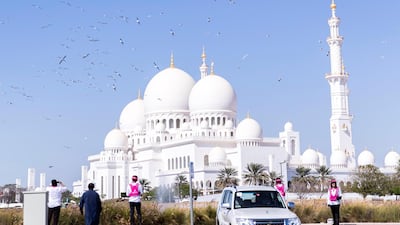Azza Al Jiely was four months pregnant when she discovered she had breast cancer.
She chose to forgo treatment until the baby was born because she feared something bad could happen.
But after her son, Mohammad, was born, her condition deteriorated. A biopsy taken when he was about a month old confirmed the cancer had grown.
"My thoughts were only towards my baby. Who would take care of him? I had a friend who battled cancer before me and I knew the treatment could be very lengthy," said Ms Al Jiely, who has lived in Abu Dhabi for 16 years but was in Sudan at the time.
“My doctor scolded me for not seeking treatment earlier. I was an educated 30-year-old who lived in the city with easy access to medical care. He said I should’ve been wiser."
She is now calling on anyone who has cancer diagnosed while they are pregnant to seek treatment immediately.
Many treatments protect the baby while addressing the disease.
"I don't advise any woman in my situation to copy me," said Ms Al Jiely, 48, a homemaker from Sudan.
"The patient should be with the doctor from the start. One should not make the decision all alone, like I did.”
October marks Breast Cancer Awareness Month and The National interviewed survivors across the country about their experience and their advice for others.
About 2.1 million women worldwide have breast cancer diagnosed each year and 627,000 died from the disease in 2018, the World Health Organisation said.
Early detection gives patients the best chance of overcoming the disease.
Ms Al Jiely had surgery in Jordan in January 2004, where she stayed with a relative and had Mohammad by her side.
“This was the most difficult period, because I was away from my other children," she said.
She is a mother to three sons – Mazin, 26, Moayad, 24, and Mohammad, now 17 – and one daughter, Maab, 21.
“After the surgery I went back to Sudan and arranged to have my chemotherapy in Saudi Arabia because there I could stay with two of my siblings, and my mother and children could stay with me," she said.
“The disease falls as a massive crisis on the patient, but God lightens its impact [psychologically] and eases things out."
Ms Al Jiely said she faced cancer "like any other disease" and tried not to worry about consequences such as pain and hair loss.
After she finished her treatment, she said she did not experience depression.
“I did not use a wig at all and when guests came to visit me I just met them as I was," she said.
“I was very positive after the treatment, because I was thinking of the people around me and I was just grateful that God gave me the chance to get treated.”
She said she also enjoyed “doing artistic styles” with her hair after it grew back.
“Before I never dared to do highlights or unusual cuts. I started doing all of that after it grew back," she said.
Ms Al Jiely had cancer diagnosed for a second time in her other breast a few years later but is now in remission.
“I wish that each cancer patient could deal with the disease as if it were a normal condition and not face it with fear and panic," she said.










